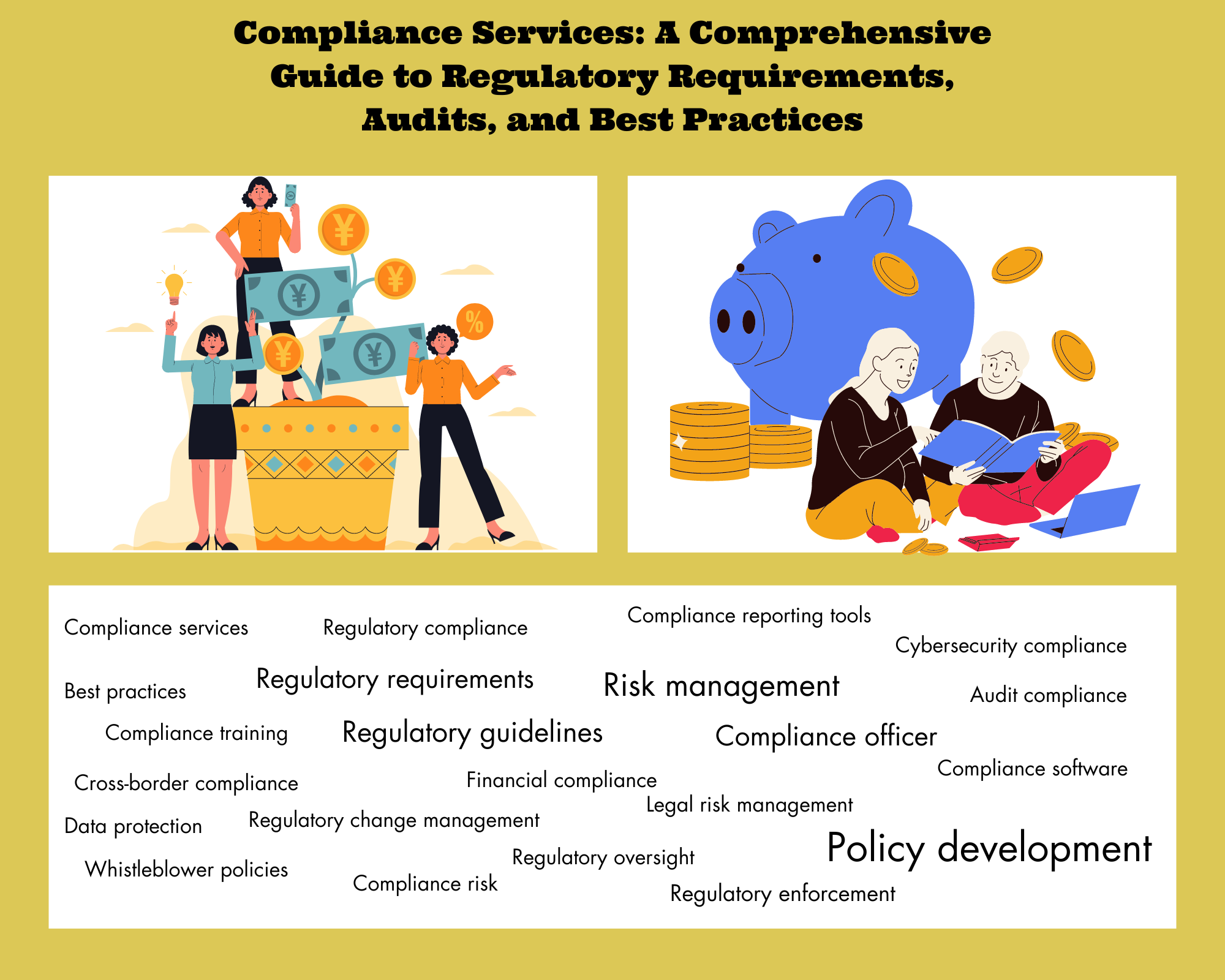Compliance Services: A Comprehensive Guide to Regulatory Requirements, Audits, and Best Practices
Introduction to Compliance Services
What is Income Tax?
Regulatory compliance meaning encompasses the adherence to laws, regulations, and guidelines relevant to business operations. The importance of compliance cannot be overstated in today's complex business environment. Types of compliance include corporate, tax, trade, and environmental compliance, each playing a crucial role in modern business operations

Regulatory Compliance Framework
Key regulations affecting businesses vary by industry and jurisdiction. Regulatory compliance associates play a vital role in ensuring organizations meet these requirements. Compliance GRC (Governance, Risk, and Compliance) provides a holistic approach to managing compliance obligations
Corporate Compliance
Corporate governance code essentials form the backbone of corporate compliance. In India, corporate governance Clause 49 requirements set standards for listed companies. Legal compliance in HR is another critical aspect, covering areas such as labor laws and workplace safety
Tax Compliance
Tax compliance meaning extends to fulfilling all tax obligations accurately and timely. Tax compliance services for businesses help organizations navigate complex tax laws and integrate tax compliance with overall compliance strategy
Compliance Audit
A compliance audit is a comprehensive review of an organization's adherence to regulatory guidelines. Compliance auditor qualifications typically include relevant certifications and experience. The compliance audit process involves planning, fieldwork, and reporting
Compliance Reporting
Compliance reporting involves documenting and communicating an organization's compliance status. Types of compliance reports vary based on regulatory requirements. Best practices in compliance reporting include accuracy, timeliness, and clarity
Anti-Money Laundering (AML) Compliance
What is AML (Anti-Money Laundering)? It's a set of procedures designed to prevent the disguising of illegally obtained funds. AML compliance requirements for businesses include customer due diligence and suspicious activity reporting
Know Your Customer (KYC) Compliance
Compliance KYC processes involve verifying the identity of clients and assessing potential risks of illegal intentions. KYC in different industries may have varying requirements. Technology in KYC compliance has revolutionized the verification process
Environmental Compliance
Environmental compliance certificate requirements ensure businesses operate within environmental regulations. Green compliance initiatives are becoming increasingly important as organizations focus on sustainability
Trade Compliance
Import/export regulations form the core of trade compliance. Trade compliance risks include penalties for non-compliance and reputational damage. Technology in trade compliance management has improved efficiency and accuracy
Compliance Risk Management
Identifying and assessing compliance risks is crucial for effective management. Compliance risk mitigation strategies should be integrated into enterprise risk management frameworks
Compliance Training
Developing effective compliance training programs is essential for creating a culture of compliance. Compliance training for different organizational levels ensures comprehensive understanding. Measuring the effectiveness of compliance training helps in continuous improvement
Technology in Compliance
Compliance management software solutions streamline compliance processes. Data analytics in compliance monitoring provides valuable insights. Emerging technologies like AI and blockchain are impacting compliance services
Compliance Services Providers
Types of compliance service providers include consultancies, law firms, and specialized compliance firms. Choosing the right compliance consultant is crucial for effective compliance management. Pune consultancy services for compliance offer local expertise
Legal Firms and Compliance
Legal firms play a significant role in compliance services, offering expertise in regulatory interpretation. A legal firm in Pune may offer specialized compliance service offerings. Collaboration between legal and compliance functions enhances overall compliance effectiveness
Compliance for Different Business Structures
Compliance requirements for corporations differ from those for small businesses. Multinational corporation compliance challenges include navigating diverse regulatory landscapes
Industry-Specific Compliance
Financial services compliance, healthcare compliance, and manufacturing sector compliance each have unique requirements and challenges
Compliance in Pune
Companies in Pune face a dynamic compliance landscape. Pune consultant services for regulatory compliance offer localized expertise. Corporation Pune must adhere to specific compliance requirements
Developmental Programs in Compliance
Professional development for compliance officers is crucial in the ever-evolving regulatory landscape. Compliance certification programs enhance credibility. Staying updated with regulatory changes is an ongoing requirement
International Compliance Considerations
Cross-border compliance challenges include dealing with conflicting regulations. Global compliance standards and frameworks help in managing compliance in multinational operations
Compliance and Corporate Culture
Building a culture of compliance starts with leadership commitment. Integrating compliance into business processes ensures it becomes part of daily operation
Future Trends in Compliance Services
Emerging areas of regulatory focus include data privacy and cybersecurity. The impact of technology on compliance functions is profound, changing how compliance is managed and monitored
Case Studies
Examining successful compliance program implementations and lessons learned from compliance failures provides valuable insights. Best practices in different industries can be adapted to specific organizational needs
Compliance Services for Startups
Essential compliance considerations for new businesses include understanding regulatory requirements from the outset. Cost-effective compliance strategies for startups focus on prioritizing key areas of risk
FAQs
What is the difference between regulatory compliance and legal compliance?
Regulatory compliance focuses on industry-specific rules, while legal compliance covers broader legal obligations.
How often should compliance audits be conducted?
The frequency depends on the industry and specific regulations, but annual audits are common for many organizations.
What are the key components of an effective compliance program?
Key components include risk assessment, policies and procedures, training, monitoring, and corrective action.
Compliance services play a crucial role in today's business environment.
From regulatory compliance associates to compliance auditors, professionals in this field help organizations navigate complex regulatory landscapes. Whether it's corporate governance, tax compliance, or industry-specific regulations, the importance of robust compliance programs cannot be overstated. As the regulatory environment continues to evolve, staying informed and adaptable will be key to successful compliance management.